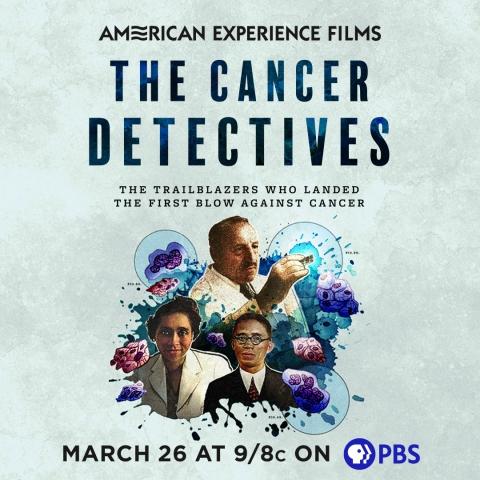The “War Against Cancer” Started Earlier Than You Might Think. The Pap Test Launched It All.

Image courtesy of PBS
In the early 20th century, a cervical cancer diagnosis was essentially a death sentence. Then came Dr. George Papanicolaou and his smear test. CSC was invited to an exclusive preview of a new PBS documentary that explores the history of this lifesaving test and the extraordinary people who helped bring it to the masses.
Few people may know the Pap smear by its full name, the Papanicolaou smear, or the story of the pioneering physician who discovered it. The history of this groundbreaking test, and the heartbreaking fate many women faced before it existed, isn’t a story widely known or shared. That’s changing with the release of a new PBS documentary from filmmakers Amanda Pollak and Gene Tempest, “The Cancer Detectives.” It premiered on Tues., March 26. Learn more and watch the film.
Before the Pap test was introduced in the 1940s, the mortality rate among women diagnosed with cervical cancer hovered near 80%. It was the No. 1 killer of women in the U.S.1 In most cases, the cancer was discovered too late. And by then, it often had spread to other organs. Once the Pap test proved effective, it took national mobilization to make it available to millions of women.
Importantly, the film also explores racial disparities and health inequities that limited education about cancer and access to the Pap test.
What Is the Pap Test?
The Pap smear — today considered a routine test for cervical cancer screening — involves collecting a sample of cells from a woman’s cervix.1 The sample is then screened for the presence of abnormal cells, which can lead to cervical cancer. Detecting and treating these abnormal cells early can prevent most cases of the disease. That’s why the U.S. Preventive Services Task Force recommends that women ages 21-65 get routine screening with the Pap test (recommended frequency varies based on individual risk).2
Today the Pap smear’s track record at saving lives is astounding. Regular Pap screening reduces the rate of cervical cancer incidence and mortality by 80% or more.3
It’s hard to believe that this lifesaving test almost didn’t make it out of the research lab. Multiple obstacles, including shame about discussing women’s health and body parts, threatened its progress.
“The Cancer Detectives” focuses on the work of four pioneers who overcame these and other challenges to bring the Pap test to the masses: a Greek immigrant doctor, George Papanicolaou; his wife and lab partner, Mary; a Japanese-born illustrator, Hashime Murayama; and an African American OBGYN, Dr. Helen Dickens. Thanks to their hard work, and the collective efforts of early cancer advocates and activists, the Pap test changed the course of women’s lives — and cancer history.
CSC’s CEO Sally Werner, R.N., B.S.N., M.S.H.A., attended an exclusive virtual preview of the film, part of PBS’s American Experience history series. (The film premiered on Tues., March 26, at 9 ET/8 CT on PBS.)
“I loved the resilience of the men and women who are highlighted,” Werner reflects. “They faced many obstacles along the way, but ultimately, they changed the face of cancer care through their own professional and personal determination.”
Werner also appreciates the film’s nod to the many other hard-working people and coalitions, including the Women’s Field Army, who helped make cancer and women’s health a part of the national conversation. “As a nurse and nonprofit leader, I know it takes a community to impact healthcare change. Everyone in this film, from the researchers, illustrators, and advocates, contributed to the outcome.”
References
1. Yale Medicine. Pap Smear. Yale Medicine website.
2. U.S. Preventive Services Task Force. Final Recommendation Statement, Cervical Cancer: Screening. USPSTF website.
3. National Institute of Health. National Cancer Institute. Cervical Cancer Screening (PDQ®)-Health Professional Version. Cancer.gov website.